
The convex horseshoe bat is a species of bat in the family Rhinolophidae. It is found in Malaysia and Laos.
Xymene convexus is a species of predatory sea snail, a marine gastropod mollusc in the family Muricidae, the rock snails or murex snails.

Chasmagnathus convexus is a common mud-flat crab of the family Varunidae, which is endemic to East Asia. In Japan, this crab is commonly called hamagani. This crab has two forms that differ in color; one is olive green and the other is purple. Differences in diet are believed to be responsible for the color variation between the two forms. C. convexus is large, relative to related crabs, and can reach 4.5 to 5 centimetres wide across its carapace. It is predominantly nocturnal.
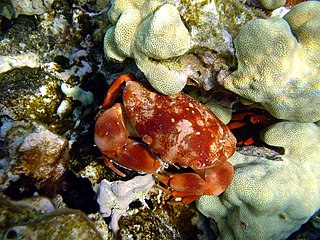
Carpilius convexus is a species of crab that lives in the Indo-Pacific, from Hawaii to the Red Sea and South Africa. It was first described by Peter Forsskål in 1775 as "Cancer convexus", and has sometimes been treated as a variety of the larger species Carpilius maculatus. The biology of the genus Carpilius is poorly known. A Carpilius convexus coloration is a yellow-brown or red, with patches that are mainly brown, growing up to 25 cm. Despite us knowing their size, coloration, and habitat, little is known about their biology till this day.
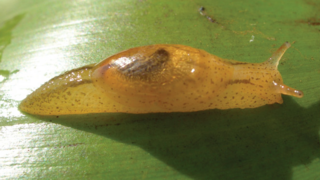
Omalonyx convexus is a species of air-breathing land snail, a terrestrial pulmonate gastropod mollusc in the family Succineidae, the amber snails. This species of snail is found on emergent vegetation in lentic environments, and also submerged among macrophytes.
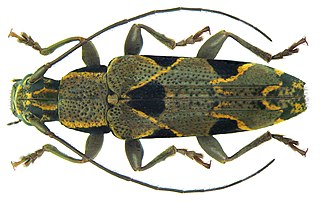
Tmesisternini is a tribe of beetles in the subfamily Lamiinae containing the following genera:
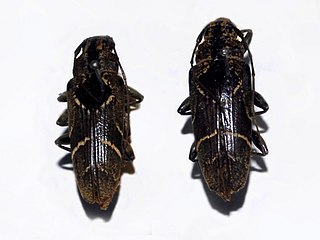
Tmesisternus is a genus of longhorn beetles belonging to the family Cerambycidae, subfamily Lamiinae.
Tmesisternus agriloides is a species of beetle in the family Cerambycidae. It was described by Francis Polkinghorne Pascoe in 1867.
Tmesisternus brassi is a species of beetle in the family Cerambycidae. It was described by Gressitt in 1984.

Tmesisternus distinctus is a species of beetle in the family Cerambycidae. It was described by Jean Baptiste Boisduval in 1835.
Tmesisternus dubius is a species of beetle in the family Cerambycidae. It was described by Xavier Montrouzier in 1855.
Tmesisternus excellens is a species of beetle in the family Cerambycidae. It was described by Per Olof Christopher Aurivillius. It is known from Papua New Guinea.
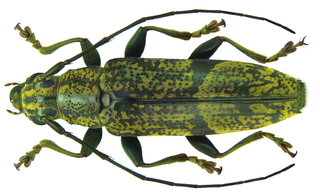
Tmesisternus griseus is a species of beetle in the family Cerambycidae. It was described by James Thomson in 1865.
Tmesisternus jaspideus is a species of beetle in the family Cerambycidae. It was described by Jean Baptiste Boisduval in 1835.
Tmesisternus postfasciatus is a species of beetle in the family Cerambycidae. It was described by Stephan von Breuning and De Jong in 1941. It is known from Papua New Guinea.
Tmesisternus schaumii is a species of beetle in the family Cerambycidae. It was described by Francis Polkinghorne Pascoe in 1867. It is known from Moluccas, Australia, and the Solomon Islands.
Tmesisternus semivittatus is a species of beetle in the family Cerambycidae. It was described by Stephan von Breuning in 1945.
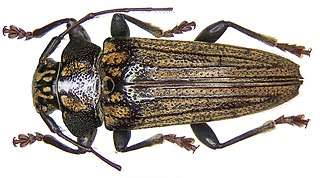
Tmesisternus venatus is a species of beetle in the family Cerambycidae. It was described by James Thomson in 1864.
Haroldiataenius convexus is a species of aphodiine dung beetle in the family Scarabaeidae. It is found in North America.

Cylisticus convexus, the curly woodlouse, is a species of woodlouse in the family Cylisticidae. It is found in Europe and Northern Asia, North America, and South America.








